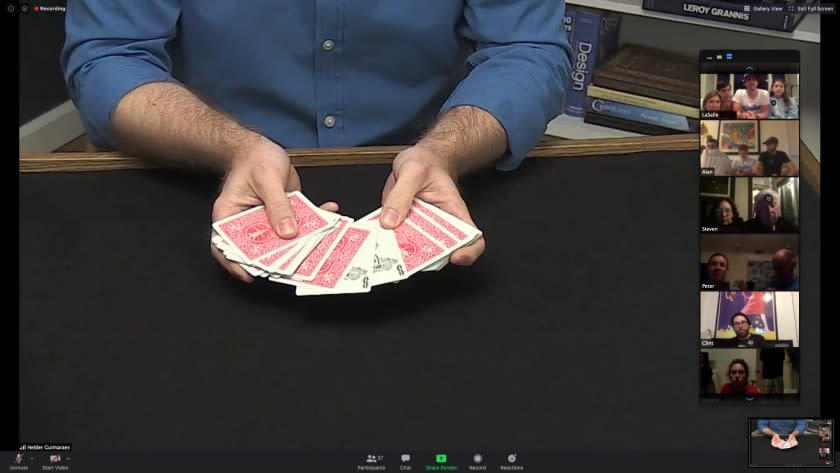Review: Magician Helder Guimarães turns Zoom into the theater of 'The Present'

“The Present,” Helder Guimarães’ virtual magic show, is the closest approximation I’ve had to being in a theater since the pandemic closed the venues. The show contains a slew of card tricks, but the real sleight of hand is the transformation of digital into theatrical space.
My portal of entry to this Geffen Playhouse world premiere was a laptop computer perched on my kitchen table. A Zoom link whisked me inside. The ticket was a mystery box sent in the mail.
I was told in a ticket confirmation email that I could open the shipping package but not the box inside. The object, enigmatic and forbidding, sat for days on a bookcase in my living room. Even the cats stayed away.
The house manager checked us in individually for this offering from the newly coined Geffen Stayhouse Theater. We were advised that the speaker view option on Zoom provided the best way of experiencing the show. I kept reverting to gallery view, however, because I liked seeing the reactions of all the audience members. (Each performance is capped at 25 households, creating both intimacy and critical mass.)
Guimarães is a magician Jorge Luis Borges might have dreamed up. A storyteller with a philosophical air and an unplaceable accent, the Portuguese-born illusionist began with an anecdote about an earlier experience of what he called quarantine.
When he was 11, he was hit by a car, the impact of which caused an epileptic seizure. For three days he was in a coma. When he was well enough to be released from the hospital, he was confined to his home and placed under the watchful eye of his grandfather, a distant figure in his life, while his parents were at work.
Suddenly aware of his mortality, Guimarães said he took refuge in the present. What occupied this young adolescent removed from his school friends was magic. It was in this period of enforced convalescence that he became a magician.
Magic as an activity to ward off death, magic as a way to alleviate isolation. These associations from Guimarães’ vocational beginnings resonate hauntingly in a pandemic that has made social distancing our new normal.
The stated objective of “The Present” is to share some mystery together. The show's title has a double meaning: The gift being offered at this challenging time is to be held rapt in the uncanny moment.
Mission accomplished. But because the tricks depend on audience members carefully following instructions, the magic wasn’t without a few glitches. Distracted by the sheer delight of being visibly surrounded by an audience, I bungled a few tricks myself. Every time my microphone was muted by the stage manager, I wondered if I had done something wrong. I misheard one direction and assumed I messed up, but when I found the card I thought I had misplaced I became an instant believer in a supernatural force greater than my clumsiness.
Guimarães’ previous Geffen show, “Invisible Tango” (also directed by film producer Frank Marshall), may have been smoother with the legerdemain. But Guimarães was unruffled when, during a word puzzle segment, the participant didn’t seem to understand what was required of her. Somehow our fallibility drew us closer while deepening the mystery of the vast majority of tricks pulled off without hitch.
As with “Invisible Tango,” I found the anecdotes in “The Present” to be slightly more enthralling than the illusions. But the two work hand in hand: As Guimarães makes us more attuned through his trickery to what we can’t see, he tells us about what he came to learn about his seemingly stern grandfather, the relative who wore bulky shoes indoors, gave gifts of socks at Christmastime and played the harmonica behind a closed door.
Deception transforms into unveiling, the greatest magic of all. “The Present” casts perhaps its most potent spell in making the strange affectionately familiar. The show represents the present rather than the future. But watching alone on Zoom, I was once again among my tribe, grateful to be spellbound.

